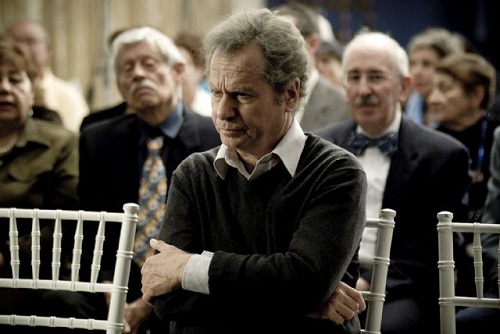Review: Footnote

I've long been a fan of foreign films, but often feel alienated by films that focus on Jewish culture due to my own ignorance and unfamiliarity. I was hesitant about viewing Footnote, which is centered around two characters involved in Talmudic studies, but as the Israeli official selection to the Best Foreign Language Film category for this year's Oscars I felt this film might provide me with much needed insight. I was pleasantly surprised not just by the content and narrative, but the filmmaking in this award-winning movie.
The main theme of Footnote is rivalvry between men -- most notably that of father and son Eliezer (Shlomo Bar-Aba) and Uriel Shkolnik (Lior Ashkenazi), both professors in the Talmud department of Hebrew University in Jerusalem. Eliezer is a philologist, studying the historical language of the Talmud. On the brink of the publication of groundbreaking research that has taken over 30 years, his work is sniped by another rival at the university who proves his thesis but makes his work unnecessary. His greatest pride is having been referenced in a footnote in a manuscript by a teacher and mentor.
Eliezer's son, Uriel Shkolnik, is more successful for his studies and receives accolades and adoration for his cutting-edge theories on the de-feminization of the Jewish man. However, over-achiever Uriel also demands "constant mild flattery" and wants more recognition for himself. When a clerical error jeopardizes who is the true winner of Israel's most prestigious national award, The Israel Prize -- for which Eliezer has been passed over for 20 years -- Uriel must come to terms with the rivalry between himself and his father, and make a decision that greatly impacts both men's lives.
Writer/director Joseph Cedar is a master craftsman, constructing a complex foundation of the relationship between father and son. Nothing is simply resolved, and despite the narrative's levity Footnote does not have a happy ending in the traditional sense. In fact, the ending is rather abrupt, which at first might seem a bit unexpected yet is quite appropriate for the complexity of this tale.
The characterization of the main characters as well as the supporting roles of their wives is well done and also well cast. Bar-Aba is excellent in his portrayal of a man still waiting for the spotlight to fall on him, and set in his ways from walking every day to the National Library to his expressions -- "one cannot draw evidence from fools." Ashkenazi effectively portrays an overly self-assured man who doesn't realize that his mental bullying might have something to do with his clothes being stolen in a locker room, or that he's "a coward -- nice man afraid of confrontation" as stated by wife Dikla (Alma Zack). Uriel is just as helpless in his own relationship with his son Josh (Daniel Markovich), in an unending cycle of paternal disengagement.
The cinematography of Footnote is fresh and often reminiscent of Jean-Pierre Jeunet's with intermittent extra scenes stitched in, including "footnotes" about the characters. The musical score is a bit heavy-handed at times, but tolerable and doesn't detract from the pacing. I found this film to be rather engaging -- I thoroughly embraced the humor and never felt isolated from the story or its characters. The exposition is brilliantly handled, so all audiences should enjoy this film. I recommend seeing Footnote at a theater soon.

